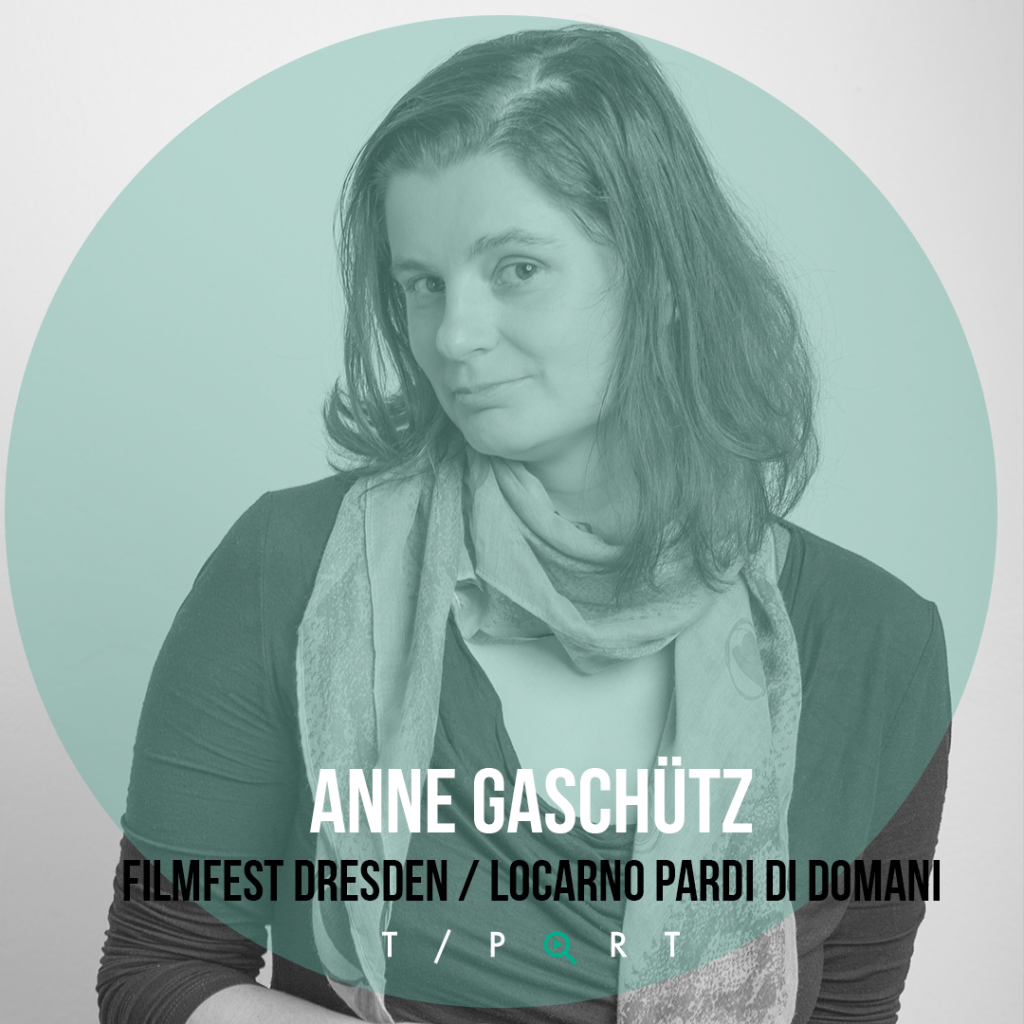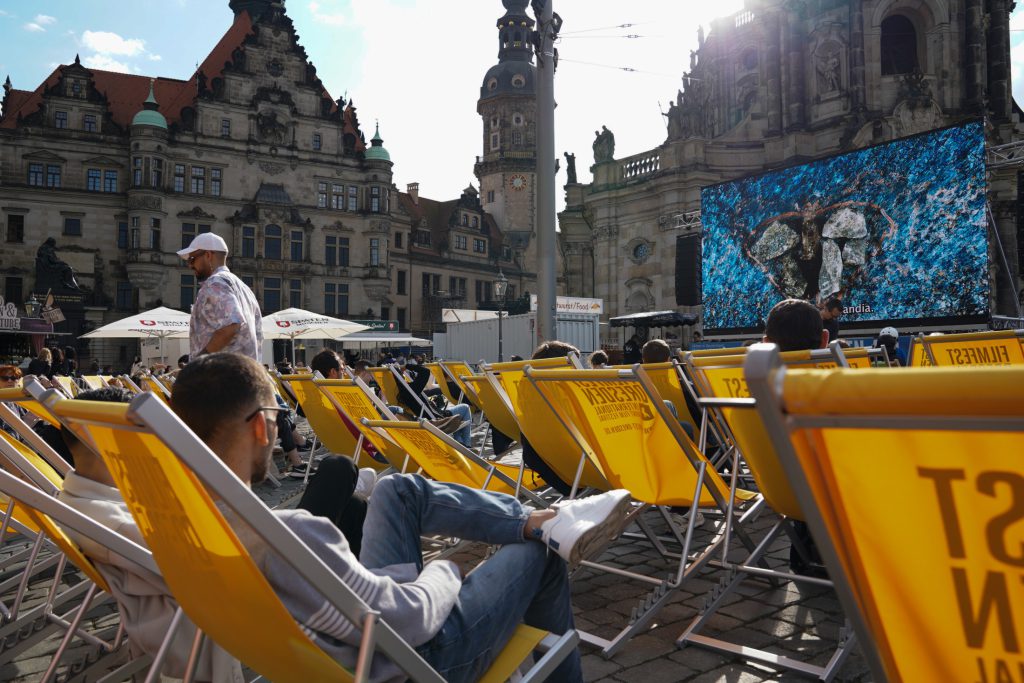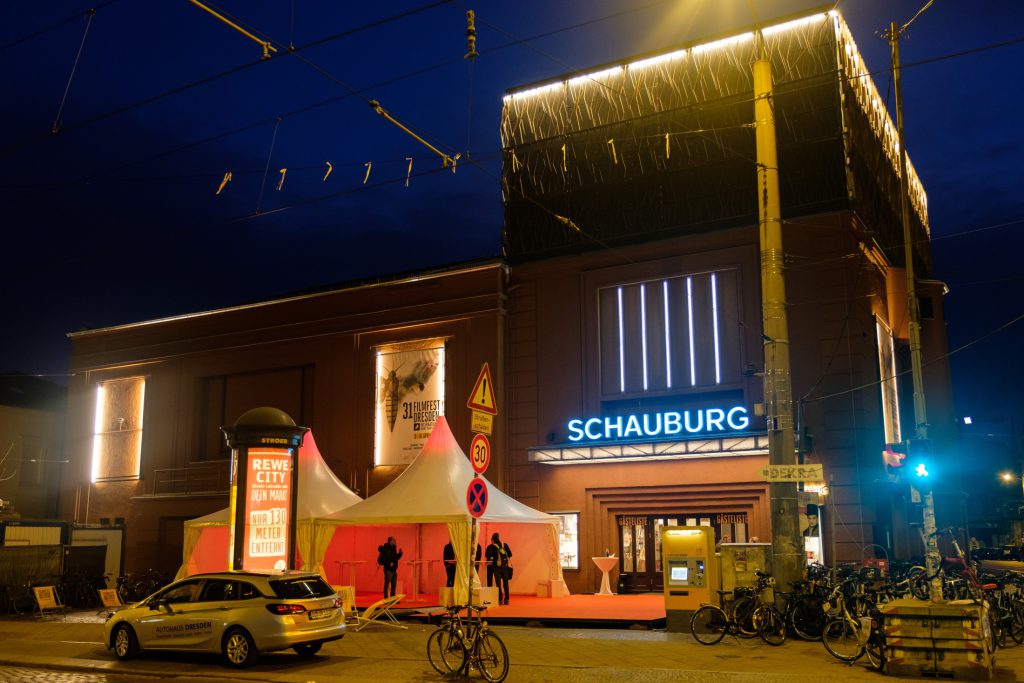
Anne Gaschütz is a busy woman! Not only is she a co-director of Filmfest Dresden, but she is part of the Selection Committee at the Locarno Film Festival’s Pardi di domani.
We caught up with her to find out why she loves short films, what she’s looking for, and to gather her considerable insights into tips for filmmakers who are looking to launch their films into the world.
Hi Anne, Thanks for chatting to us! What about your role and organisation do you find most inspiring?
In Dresden, I love the variety of my tasks and the fact that we are very free in terms of our programming and the contents we show at the festival. I love working on an international scale although my job actually varies from watching short films to writing funding applications to organising the team to making sure the ticketing goes online on time. In the past years, we have been able to really engage with current topics at the festival such as gender diversity, trigger warnings or (anti)racism. We want to be an active part in the region to promote democracy and political awareness and being able to do that with a team that shares the same values is great. To actually develop ideas together and be able to implement them is one of the most inspiring aspects of my role in Dresden.
As for Locarno, I actually very much appreciate the fact that I don’t have the responsibility I carry in Dresden but instead can solely focus on the short films and their selection. In the committee we’re a small team of four and it requires a lot of trust that we share. I love the regular meetings we have and the time we actually take to discuss the films. During the festival, we also have a lot of time to engage with all the filmmakers presenting their shorts in the Pardi di Domani section which is something I value very highly and I sometimes miss in Dresden, so Locarno is a good compensation for that.
To me, both jobs also somewhat inspire each other, as I can take a lot of input and new connections from Locarno to Dresden and vice versa. In that sense, both jobs complement each other.

Credit Elena Pagel
There are good films, but, in your personal opinion, what makes a great film and how do you separate the two?
This is a tricky question as it comes down to very personal tastes and it’s difficult to not fall into clichés I guess. To me a great film needs to stay with me for whatever reason. I want to think about it beyond its framing and story. I want to be challenged in one way or another, be it through thought-provoking topics or its visual approach, through a very creative soundscape (or lack thereof) or even just because it makes me feel very angry. Generally, I tend to remember films more that make me feel something and watching A LOT of shorts each year, it’s not that easy to trigger my emotions anymore, so I am very happy when that happens.
If you could only watch one film on a loop for the rest of time, what would it be?
I think I would have to say “First Time [The Time for All but Sunset – Violet]” by Nicolaas Schmidt. It’s 49 minutes of pure joy with its amazing soundtrack. Nothing and at the same time everything happens. There is no verbal communication and yet a lot is going on. You can just sit there on the train with the two boys, discover something new every time and once in a while you wander off in your own thoughts before getting back on track.
If I had to watch a film on a loop until the end of my life, then I would love one that still gives me space for my own mind and this one fulfils that perfectly. And didn’t I mention the soundtrack?
What makes your organisation special?
FILMFEST DRESDEN is actually rooted quite deeply in the history of Eastern Germany. Founded in 1989, its original goal was to showcase “forbidden” films. However, with the fall of the wall, this became obsolete and the festival started focusing on short films. Yet, with the former Defa-Trickfilmstudios and now the German Institute for Animated Film being located in Dresden, the festival has a special affinity to animated films to this day.
For filmmakers, our highly-endowed awards might be one of the most interesting facts about the festival. Altogether we hand out awards worth 72,000 € with the highest one of 20,000 € being handed out for a film in the National Competition.
We have been able to add a few special awards in recent years as well to complement the festival’s political engagement. Thus, we hand out an award for gender equality and diversity as well as an award for a film that discusses political issues. Special pre-juries select the nominated films and extra juries made up of experts from very different walks of life crown the winners. Both programmes then go on a post-festival tour through the rural areas in the region to enable audiences not based in Dresden to engage with these topics.
Dresden is, of course, still worth a visit even if your film is not selected in one of the competition programmes. Altogether we screen around 350 shorts each year.
Dresden is quite a cosy festival with a fantastic audience. I think it is fairly easy to engage with other film professionals but also the audience. We try to offer different opportunities to bridge the gap between filmmakers and guests, i.e. with our film talks, open air screenings or panel discussions which are not solely directed at the industry. I could go on forever about FILMFEST DRESDEN but I guess that would go beyond the scope of this interview.
As for Locarno Film Festival, it is very different to FILMFEST DRESDEN. This year we celebrated its 76th edition, so it has a strong history of showcasing amazing films. As I am only involved in the Pardi di Domani section, I can only talk about that part of the festival.
One of the most special things, I believe, in the section is the time we have and take for the films and filmmakers. We take great care in discussing the films, the whole process takes about six months. We all work in different regions, so at the end of the process we meet up in early June, rewatch our shortlisted films together and then select the 40 final films.
It’s a painstaking and very worthy process. During the festival, we also have a lot of time for the film teams and I love the fact that Locarno as a festival primarily focusing on features gives so much space for the shorts. Since the city of Locarno is not big, the festival is also quite centralised and for filmmakers it is also fairly easy to meet with other industry professionals.
I would say that Locarno is a lot more chilled than other festivals of that size, something that is surely helped by its location by the lake. Locarno’s audience is also amazing. The shorts screen in the afternoon and are usually very well attended given the impressive size of the cinema. And of course, one cannot mention Locarno without its Piazza Grande screenings. Every night you are able to watch films on a huge outdoor screen in the centre of the city. I think around 8,000 people fit onto the square which makes for a great shared cinema experience.
What advice would you give for upcoming filmmakers who want to get involved? Where do they start?
I think this is a very individual thing that is difficult to generalise. First of all, it somewhat depends if you are attending a film school, which makes things already easier, I would say, since the schools already have a structure in place and you’re sharing the experience with other students.
However, I think one of the first things to do would probably be to check out local offers. Is there a film festival or film club in your region where you might find like-minded people?
I started getting involved with the medium when I was a teenager solely because there was an offer for people like me to start trying out a camera and editing equipment and make little “documentaries” for a programme on a local TV station. It was by no means anything award-worthy but put me on the track I am now on.
I didn’t grow up with cinema or films, so these offers are certainly just as important. I would also say that if you can, don’t shy away from talking to people. If you have the opportunity to talk to either filmmakers or other industry professionals, go for it! Most festivals will offer networking opportunities, where you can also book a slot with someone which I guess is especially helpful for shy people.
As a person who hates entering a room full of strangers I can also confirm that it is very helpful to do that with someone you know. I would also say don’t put too much pressure on yourself. You don’t have to talk to everyone in the room, you don’t have to have a result at the end of a certain event. A long conversation with just one person can be worth a lot more than many short small talk conversations.
I would also say it’s a lot of help to watch other people’s shorts. If there are no events in the region, the internet is a great thing, be it vimeo staff pick, Mubi or even Netflix, most streamers have shorts on their platforms. And I personally think it’s always good to check out different styles of filmmaking and get inspired. You don’t have to love every short but the more you watch, the more you will also know what you would love to do or what you maybe should shy away from.
Generally, I would also like to add that being ambitious is great but it’s also good to appreciate the smaller things. It doesn’t have to be Cannes or Locarno all the time, specialised short film festivals big or small are just as good and often better options to network, meet people or have your film be seen.

Photo credit Michael Kaltenecker
Does your organisation recognise a particular type of filmmaker or film? If so could you describe what / who you’re looking to work with?
In Dresden we only show short films up to 30 minutes and not older than two years. We are open to any genre, however, in the competition programmes we only accept animation, fiction and hybrid formats. Documentaries and experimental films are only screened in the special sections. 50% of our competition programmes are animated films, so we are very eager to receive those animations. As mentioned before, we also have special awards for gender equality and political works, so we are also very open to receive films that deal with these topics.
In Locarno, it’s a bit different. The Swiss and International Competition are solely for filmmakers who have never made a feature film before. However, when Giona Nazzaro became the new artistic director of the festival, he introduced a new competition aimed at filmmakers who have made feature films before, the Corti d’autore section. Generally, the films in the Pardi di domani section can be up to 59 minutes long and may be of any genre or category. They must be world premieres.
Do you have any events or particular shorts you’d like to promote – tell us about them here.
For all short film lovers out there I would love to mention the upcoming Short Film Day. It is held every year on December 21, which is the shortest day of the year hence the title.
In Germany, the event is coordinated by AG Kurzfilm, the German Short Film Association but EVERYONE can participate, not just in Germany. Keep your eyes open if there are any local events happening or just organise one yourself. In Germany, for example, you can book a programme with AG Kurzfilm for little money and then screen the films in your backyard with some mulled wine or at your local gym or at school or wherever. Or just use the opportunity to screen your own shorts. It’s a great community event.
And on a more promotional note I would like to add that FILMFEST DRESDEN is currently open for submissions until December 1. So send us your shorts!
As for Locarno, submissions should open at the end of the year, so please check the website for information. Locarno has higher submission fees, the earlier you submit, the less you pay. So make sure to not miss the early deadline which is normally in February. The dates will be published soon, so keep your eyes open.
Why are short films important?
Short films are their own art form. They are creative, political, radical, evoke emotions in a short time, make you angry, cry, laugh. They can react to current events a lot faster than feature films. They educate, they stimulate, they interrogate.
Because there is not so much money in shorts, filmmakers are often more daring when it comes to experimenting with the art form. They often give you more freedom because you don’t have TV stations, money givers and producers telling you what to do. Often, there is no commercial pressure behind short film making.
Within their confinement they’re also the source of great creativity. Curating short film programmes can in itself be a form of storytelling and creating narrative arches. I think shorts are very underrated but as in most stories, the underdog is often the coolest, right?

Photo credit Fabian Catoni
Where do you see the world of Short Films in 10 years, what should/needs to change?
Our next focus topic in Dresden will be utopia, so in a very utopic way I would love to say that in 10 years’ time short films will have the same recognition as features. The short film community is fairly small and yet super lovable and that will not have changed then. But in 10 years we will have learned to pay fair wages, pay better attention to mental health and not work so much overtime anymore. We will probably have developed new forms of collaboration.
I would love the world of short film to be a lot more aware of certain issues as I do believe that we also need to take a great look at ourselves and acknowledge the fact that we are not always as inclusive and diverse as we think we are. I will spare you my more apocalyptic thoughts on the future of shorts.
What do you think is lacking in the process of distributing and promoting short films by upcoming filmmakers?
I think that the short film industry has professionalised a lot in recent years especially in terms of distribution and promotion. Of course, it’s not perfect by all means.
There are a couple of things that I believe can be a hindrance: there are certainly too many short films out there and not all of them can be equally promoted. Locarno receives 4,000 short film submissions alone, other festivals receive 6,000 and beyond. There are online platforms that also offer short films but again, there are a lot of films and I don’t know if we’re not too overwhelmed sometimes by all the offers out there?
Personally, I only subscribe to one streamer and I already find that too much to handle sometimes. So maybe less would be more in this instance? Quality over quantity as to speak?
Having said that, it is also more difficult to screen shorts at actual cinemas beyond their festival run. Screening a short film programme is expensive, cinemas are already struggling and short film programmes struggle to reach the audience.
There is certainly a lack of outlets writing profoundly about short films. We co-initiated the platform Talking Shorts with other festivals a few years ago due to a lack of proper critical writing on short film. So I guess, there could and should be more writing on short films.
What do feel young film talents lack the most today, after graduating from film school? Where are the gaps in the film industry?
From my festival perspective there is certainly a lack of education on festival distribution at film schools and it shows. I often talk to new filmmakers and realise that they learned very little at school about the life of a short film after it was made. So this is certainly something that needs to be taught more. What are the options, where can I turn to, who helps with short film distribution, what are alternatives etc.
What is your single most important piece of advice for upcoming filmmakers to follow?
Be you and be authentic. If you’re not, I can tell from your film.
If you are a film industry professional and would like access to the catalogue and more, find out here how to sign up.
Filmmaker? Upload your short film to T-Port or sign up for our newsletter to get regular updates on the current trends and exciting innovations in the short film universe.
